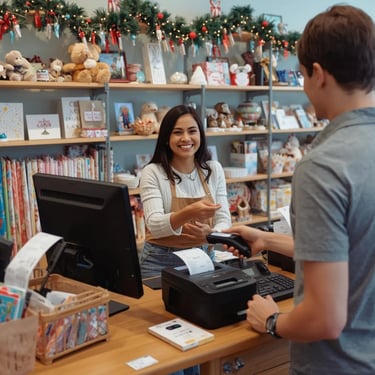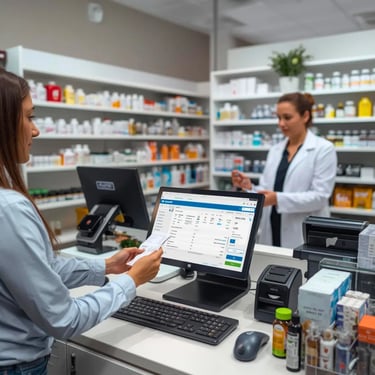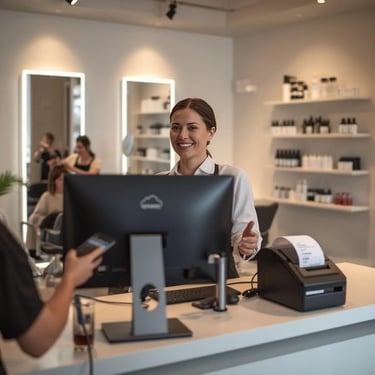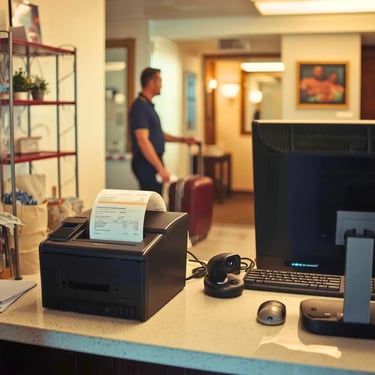What is a Cloud-Based Online Point of Sale System?
Imagine a business system that gives you complete control from anywhere in the world. A system that lets you process sales, manage your inventory, and generate insightful reports in real-time. That's exactly what a cloud-based online POS system offers.
Unlike traditional software that needs to be installed on a single computer, a cloud POS system is browser-based. This means you can access your business data from any device—be it a computer, laptop, or tablet—using popular browsers like Chrome, Edge, or Mozilla, as long as you're connected to the internet.
No Installation Required: Simply log in and start selling.
Automatic Updates: The system is always up-to-date with the latest features and security patches, without any effort on your part.
Secure Data Backup: Your data is automatically and securely stored on remote servers, so you never have to worry about a hard disk crash or data loss.
This modern approach frees you from the hassles of maintenance and technical issues, allowing you to focus on what matters most: growing your business.

What are the Differences Between a POS System and the Hardware of a POS System?
When people talk about a POS system, they often think of the screen, printer, or cash drawer at a shop counter. However, the POS system is not just the hardware—it is mainly the software that runs the business operations. Understanding the difference between POS software and POS hardware helps business owners make better decisions when upgrading their systems.
The POS system is the digital brain of your business. It is the software application that manages sales, billing, stock, reports, and customer data.
Key features of a POS system include:
Sales & Billing – Recording purchases and issuing receipts.
Inventory Management – Tracking stock in real time and alerting low-stock items.
Customer Data – Storing purchase history and loyalty information.
Reports & Insights – Providing analytics to help with decision-making.
Cloud Access – With cloud POS, you can log in from any computer or mobile device.
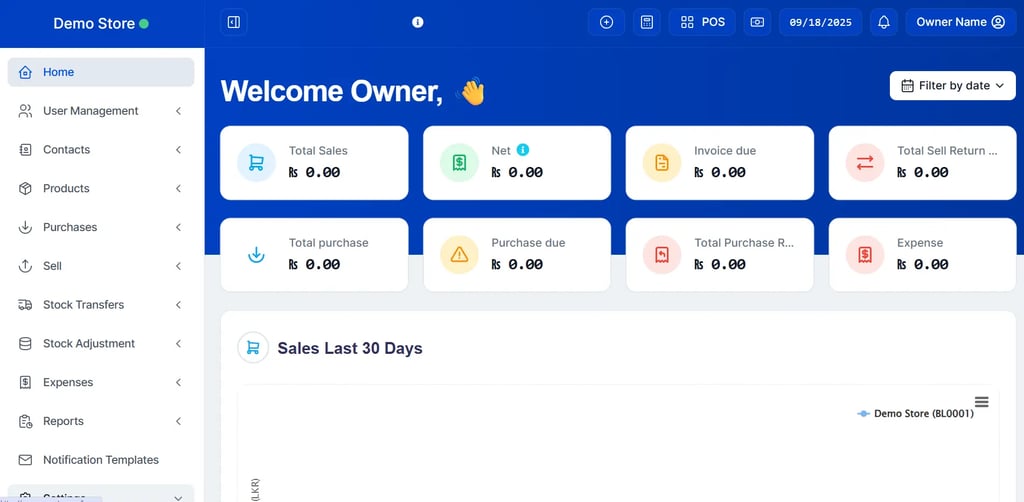

The hardware of a POS system refers to the physical equipment used to complete transactions at the counter. The hardware connects with the POS software to process payments and issue receipts.
Common POS hardware includes:
Computer, Laptop, or Tablet – To run the POS software.
Barcode Scanner – For quick product identification.
Receipt Printer – To print customer receipts.
Cash Drawer – For managing cash securely.
Card Reader / Payment Terminal – For credit, debit, or mobile wallet payments.
POS System (Hardware)
The Key Difference
The POS system (software) is what makes everything run—sales, stock, reports, and customer management.
The POS hardware is simply the set of tools you use to interact with the system at your physical counter.
In modern times, with cloud POS systems, businesses can even operate without traditional hardware. For example, a laptop and printer may be all you need to run a professional shop, making it affordable for Sri Lankan small businesses.
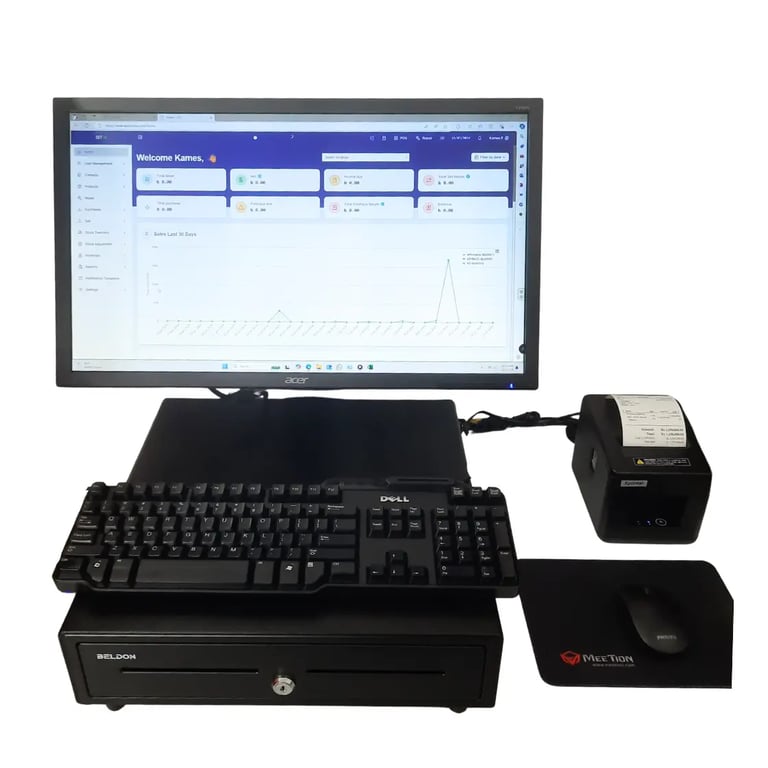

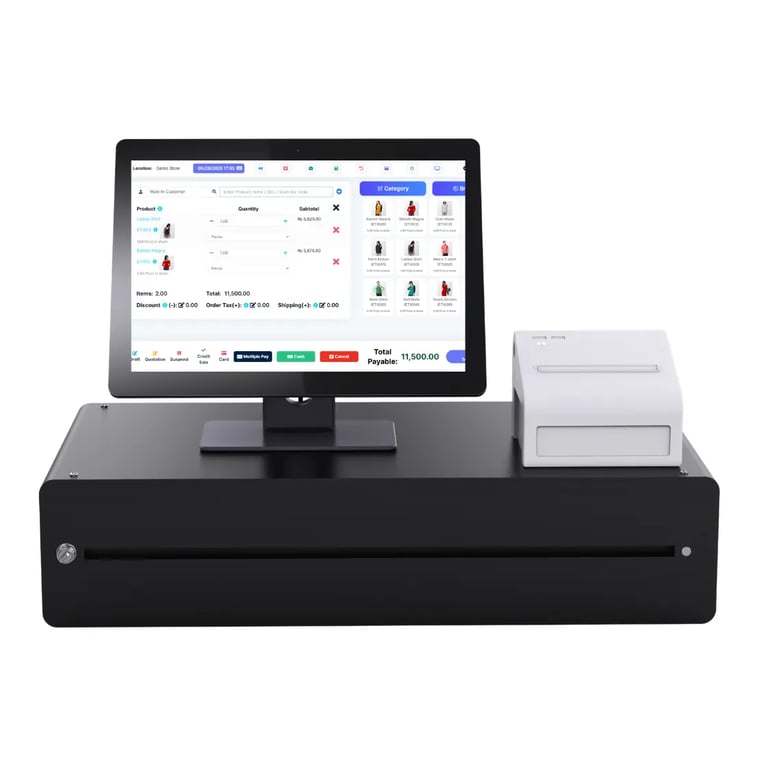

POS System (Software)
How Does an Online POS & Invoice System Work?
The core function of a retail POS system is to simplify and accelerate the checkout process. But a powerful system does much more—it manages your entire back-office operation. Let's break down how it works.
1. The POS Transaction Process (Point of Sale Sale)
A POS sale occurs when a customer makes an immediate purchase at your physical store. The system processes the transaction instantly, whether the payment is made by cash, card, or digital methods.
Scanning or Selecting Items: The cashier uses a barcode scanner or selects items from the system's interface.
Calculating the Total: The system automatically calculates the total amount, including any discounts and taxes.
Processing Payment: The customer pays, and the system records the payment method.
Generating a Receipt: The system prints or emails a digital receipt as proof of purchase.
Discount & Loyalty: Offer loyalty point and rewards, bundle discount sales.
This process is perfect for fast-paced environments like grocery stores, coffee shops, and phone shops where quick transactions are essential.
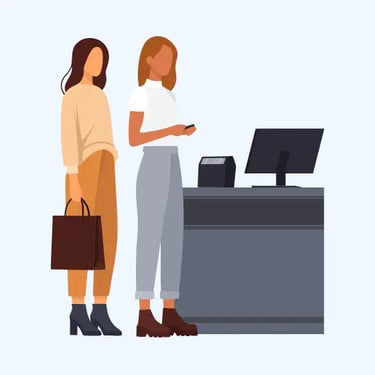
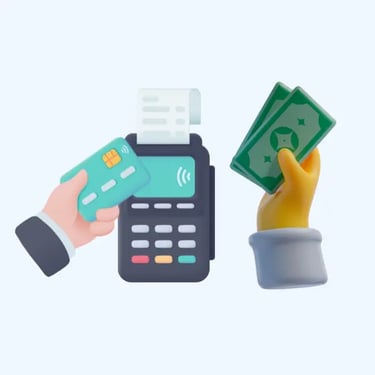
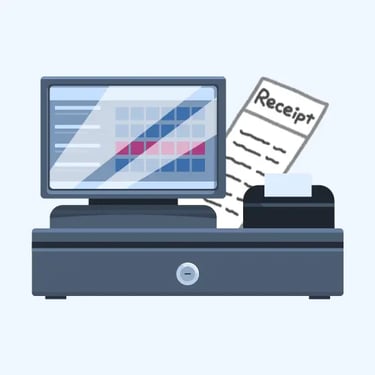
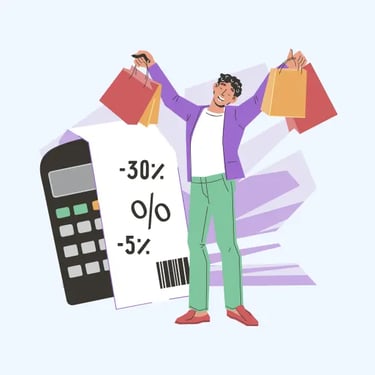
2. The Invoice Transaction Process (Invoice Sale)
An invoice sale is used for transactions with flexible payment terms, such as "Due in 30 days." This is common in business-to-business (B2B) transactions, wholesale deals, and for high-value products with warranties like electronics or industrial equipment.
Creating the Invoice: The system generates a detailed invoice with product/service details, total amount, and specified payment terms.
Tracking Payments: You can track the payment status of each invoice, send reminders or mark payments as received when they come in.
For example, when a company buys high-end electronics from you, you can issue an invoice with a payment term instead of requiring full upfront payment. This flexibility builds trust and expands your customer base.
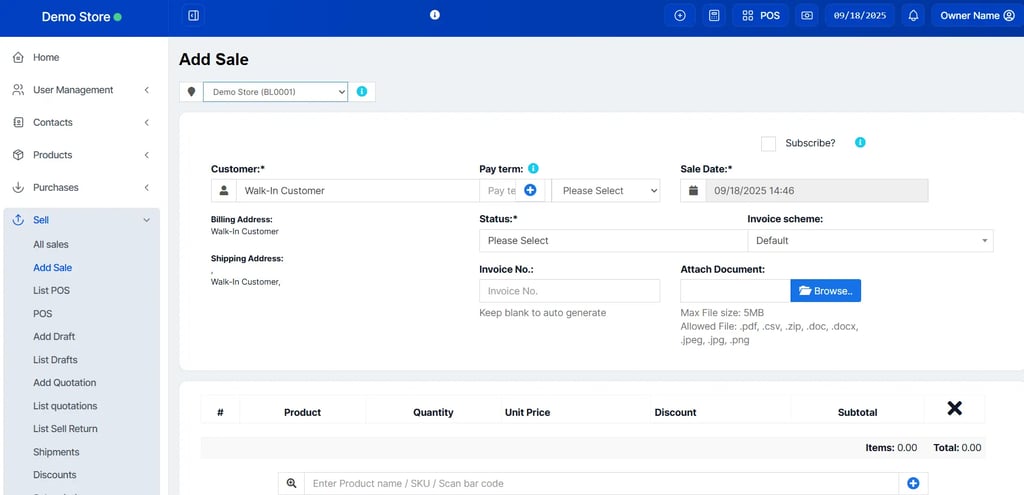

3. Back-Office Operations
Beyond the checkout, a comprehensive Cloud POS system manages the entire lifecycle of your business. Our recommended system, powered by Ultimate POS from Envato Market, offers a suite of powerful tools:
Inventory Management:
Track stock levels in real-time, preventing stockouts and overstocking.
Receive automatic low-stock alerts.
Handle various unit measurements (kg, liters, meters), perfect for diverse Sri Lankan businesses.
Organize products by brands, categories, and sub-categories.
Supplier and Customer Management:
Maintain a detailed database of your suppliers and customers.
Easily view transaction histories and manage credit/debit balances.
Purchase Management:
Track all your purchase orders and payments to suppliers.
Apply discounts and taxes to your purchases.
Comprehensive Reporting:
Generate real-time reports to gain insights into your business performance.
Analyze sales trends, profit and loss, inventory movement, and more.
User and Role Management:
Control access to your system by assigning different roles (e.g., Admin, Cashier) with specific permissions.
Who Can Use This POS System?
Our retail POS system in Sri Lanka is flexible and designed for multiple industries:
Fashion & Clothing Stores
Electronics & Mobile Shops
Bookshops & Stationery Stores
Pharmacies & Health Stores
Phone shop & Gift shop
Beauty Parlors & Salons
Restaurants, Cafés, Bars & Hotels
Wholesale & Distribution Businesses
1
Whether you sell products by pieces, kilograms, liters, or meters, the system supports variable units to match your needs. Adopting a digital solution is not just an upgrade; it's a strategic investment in the future of your business. Our solution is designed to support a wide range of industries in Sri Lanka
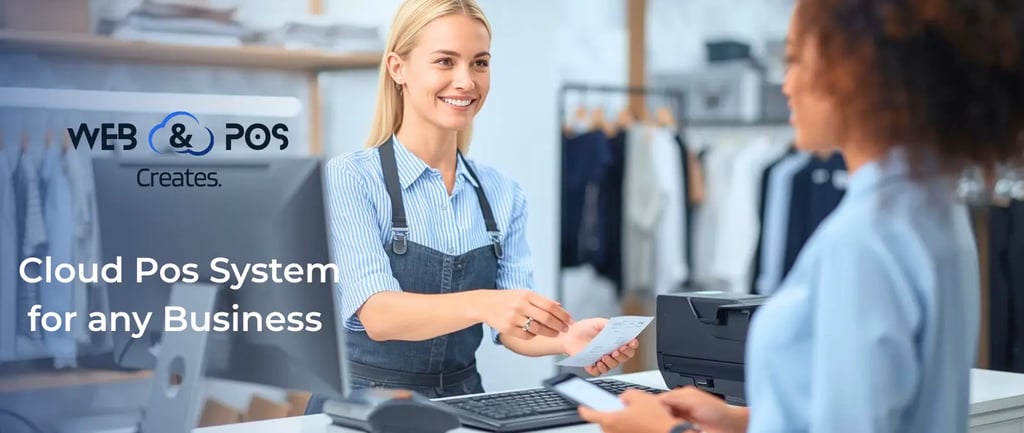

Benefits of using our Cloud Pos System?
With this system, you can efficiently manage every aspect of your business, including customers, suppliers, products, purchases, stock, expenses, payments, reports, notifications, repairs, manufacturing, hotel booking management, and much more.
Imagine having a business system that is accessible from anywhere in the world—whether you’re a shop owner or manager. A system that allows you to track sales in real-time, manage inventory effortlessly, and generate insightful reports to help you make smarter business decisions
You don’t need any unique device to run this pos & invoice system. It’s a browser-based system, meaning you can simply access it from any computer or laptop using Chrome, Edge, or Mozilla—as long as you're online.
No need to install software, worry about updates, or deal with maintenance. Just log into your system and start selling—it's that simple!
If your computer fails—say the hard disk crashes—no problem! Your data is safe. Just switch to another computer or laptop, connect your printer, and continue running your business seamlessly.
Unlike traditional POS & invoice systems, you never have to worry about backups. All your data is securely stored on a remote server with fully automated daily backups. So, you can focus on growing your business while our system takes care of the rest—hassle-free!
If you’re ready to take your business to the next level, a cloud POS system for small business is the perfect investment. From managing stock and sales to generating invoices and reports, it saves time, reduces errors, and improves customer satisfaction.
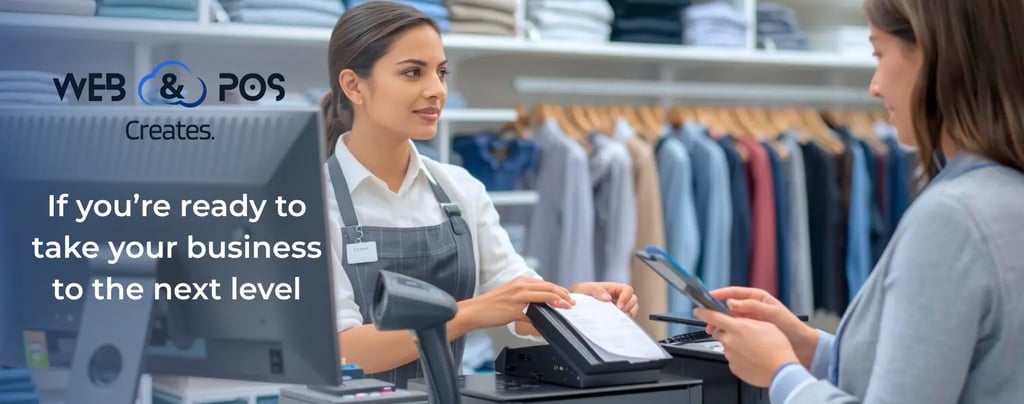

Final Thoughts and Summary?
A POS sale (Point of Sale sale) happens when a customer makes an immediate purchase at a physical store and pays on the spot using cash, card, or digital payment methods. The system processes the transaction instantly, and the customer receives a receipt as proof of purchase. This type of sale is common in retail stores, restaurants, and supermarkets where products or services are bought and paid for immediately.
On the other hand, an invoice sale is used when a business sells products or services with payment terms, such as "Due in 30 days," and the customer pays within the agreed timeframe. This is commonly used in business-to-business (B2B) transactions, wholesale deals, and service-based industries where clients are billed after the service is provided. Invoice sales are also common for high-value, long-warranty products like electronics, home appliances, and industrial equipment. Businesses often provide flexible payment terms for such products, allowing customers to pay in installments or after a certain period while still receiving warranty coverage.
For example, buying a cup of coffee at a café is a POS sale because you pay instantly. However, if a company orders office supplies from a vendor and agrees to pay after a month, that’s an invoice sale. Similarly, when a business purchases high-end electronics like commercial printers or industrial refrigerators with a multi-year warranty, the supplier may issue an invoice with a payment term instead of requiring full upfront payment. Understanding the difference helps businesses manage their transactions effectively and choose the right method based on their sales process. This version makes it more relevant for electronics and warranty-related sales. Please let me know if you require any additional refinements. 🎬🚀
we understand the unique challenges faced by small businesses. That's why we've designed our POS system to be user-friendly, affordable, and scalable. We're here to help you simplify your operations, enhance your customer service, and ultimately, grow your business."

